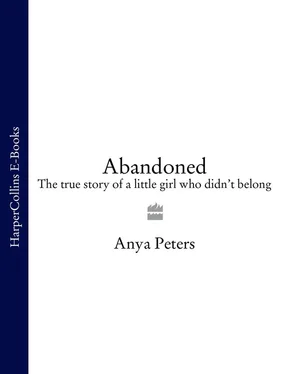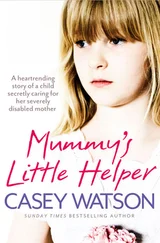The true story of a little girl who didn’t belong

 Copyright
Copyright
This is a work of non-fiction. In order to protect privacy, some names and places have been changed.
HarperElement
An imprint of HarperCollins Publishers Ltd. 1 London Bridge Street London SE1 9GF
www.harpercollins.co.uk
HarperElement is a trademark of HarperCollins Publishers Limited
Published by HarperElement 2007
© Anya Peters 2007
Anya Peters asserts the moral right to be identified as the author of this work
A catalogue record for this book is available from the British Library
All rights reserved under International and Pan-American Copyright Conventions. By payment of the required fees, you have been granted the nonexclusive, nontransferable right to access and read the text of this ebook on-screen. No part of this text may be reproduced, transmitted, downloaded, decompiled, reverse engineered, or stored in or introduced into any information storage and retrieval system, in any form or by any means, whether electronic or mechanical, now known or hereinafter invented, without the express written permission of HarperCollins ebooks
HarperCollins Publishers has made every reasonable effort to ensure that any picture content and written content in this ebook has been included or removed in accordance with the contractual and technological constraints in operation at the time of publication
Source ISBN: 9780007245727
Ebook Edition © OCTOBER 2009 ISBN 9780007348305
Version: 2017-06-08
To Mummy,
whose love was always there
as the dock leaf to soothe the sting of him …
And to Brendan, for never letting go.
‘Although the world is full of suffering,
it is full also of the overcoming of it.’
(Helen Keller, 1880–1968)
Cover
Title Page
Copyright
Dedication
Epigraph
Chapter 1
Chapter 2
Chapter 3
Chapter 4
Chapter 5
Chapter 6
Chapter 7
Chapter 8
Chapter 9
Chapter 10
Chapter 11
Chapter 12
Chapter 13
Chapter 14
Chapter 15
Chapter 16
Chapter 17
Chapter 18
Chapter 19
Chapter 20
Chapter 21
Chapter 22
Chapter 23
Chapter 24
Chapter 25
Chapter 26
Chapter 27
Chapter 28
Chapter 29
Chapter 30
Chapter 31
Chapter 32
Chapter 33
Chapter 34
Chapter 35
Chapter 36
Chapter 37
Chapter 38
Chapter 39
Chapter 40
Chapter 41
Chapter 42
Chapter 43
Chapter 44
Chapter 45
Chapter 46
Chapter 47
Chapter 48
Chapter 49
Epilogue
Acknowledgements
About the Publisher
It’s after an argument. Mummy stands at the kitchen table counting out plates. It’s roast chicken, which means it’s a Sunday. And I know it’s after an argument because she calls Daddy ‘him’.
She runs through us all in her head, tapping out numbers against her palm, then slides that number of plates along the counter from the stack she has taken from the shelf.
‘Wait … who have I missed?’
I look up, nervous that it’s me. My two eldest sisters, Marie and Sandra, aren’t there that day so there should be seven.
‘Him, Michael, Liam, Stella, Jennifer, you, me,’ she says, counting us out again by name.
She always counts the plates out like that, in that order: almost by ages, except she puts the girls before me, and herself at the end. I like the way she puts me with her at the end, the way she says, ‘… you, me …’ Always like that.
Mummy never leaves me out; she treats us all the same, but every mealtime I’m waiting for the same thing, for there to be one plate short, or not enough of something to go around. And for my uncle, or even one of the others imitating him, to look around at me and say, ‘She can do without. She doesn’t belong here anyway.’
It’s what Daddy is always saying, screaming it out week after week in drunken arguments.
‘She’s not wanted here, right! She doesn’t belong here. I want her out.’
I feel my brothers and sisters stiffen on the settee beside me, rolling their eyes at each other. I know they’re all thinking the same thing: thinking that I’m the troublemaker; wishing I wasn’t there; that Daddy wouldn’t shout and argue half as much if I wasn’t, that they could watch TV in peace.
‘She’s not wanted. They dumped her over here with you because they didn’t want her over there and she’s not wanted here either. I want her out,’ he says, snapping open another beer, ‘she doesn’t belong here.’
I hold my nose to stop the tears, trying to lean back behind the others on the settee so he can’t see me, staring hard at the wires at the back of the TV, not daring to watch the screen in case something on it triggers my tears. He’ll hit me harder if he sees me crying. He always does.
‘She’s only a child; none of this is her fault. Leave her alone, you bully. Go and pick on someone your own size. She’s no trouble at all. This is my home, and if I want her here, she’ll stay,’ Mummy yells in the background.
I wish she would just stop, not argue back. Mummy is worn out trying to stand up for me – but usually she just makes it worse.
‘She’s wanted nowhere, right!’
‘Yes she is, you cruel drunk … Don’t listen to him, Anya.’
But I have to.
‘Why did they leave her over here then? Who wants her?’ he screams. ‘No one!’ he says louder, slamming the words into me.
‘Yes they do! I want her!’ Mummy hollers into the room.
I try everything to keep my tears in, but eventually they burst out, hiccupping as they come, my shoulders heaving, and he is over me, his fist raised, ready to give me ‘something to really cry about’.
Mummy wasn’t my real mum. Her younger sister, Katherine, who everyone called ‘Kathy’, was my real mum. I can’t remember a time when I didn’t know that. Anyway, my uncle, who I grew up calling ‘Daddy’ like the rest of my brothers and sisters, would never have allowed it to be kept a secret. He took every opportunity to remind me that Mummy wasn’t my real mum, that I didn’t belong with them, and that any day I’d be sent over ‘to that whore of a mother of yours in Ireland’.
Kathy was twelve years younger than Mummy, and beautiful. She was slim and elegant, with long, soft-red curls like shiny new pennies down her back, and eyes that were almost navy blue. She had the tiniest hands I, or any of my brothers and sisters, had ever seen on a grown-up, little doll’s hands, with long oval nails always painted a pearly pink colour. I was fascinated by her: by her beauty and calmness and easy laughter, by her soft Irish accent and her gentleness with me. But I was fearful of her too, always on my guard with her, determined to keep her at a distance. Determined to let Mummy see that she was my mum, not her sister Kathy.
For years Kathy wore a heavy, gold charm bracelet that clattered noisily at her wrist, and on each visit there’d be a new charm or two. My brothers and sisters would gather around her, choosing their favourite. One of my earliest memories is watching, out of the corner of my eye, my brother Liam sitting in stripy pyjamas in her arms as we all watch TV in the small front room of our flat. He holds up her bare arm and sleepily goes through the charms one by one, trying to choose his favourite between a miniature of the Houses of Parliament and a cat with tiny, diamond-encrusted eyes. I watch her small hand stroking the back of his blond head, her red curls falling down across his chest, and feel suddenly cold and stiff, too young to put words to the mixture of jealously and hate I feel as I look on. I am eight months younger than Liam, but my uncle doesn’t allow anyone to hold or touch me like that.
Читать дальше


 Copyright
Copyright










